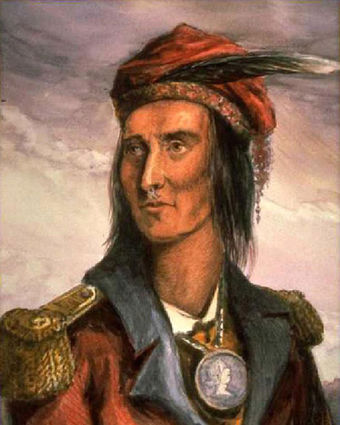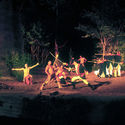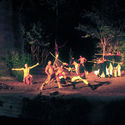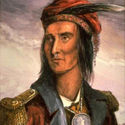Tecumseh: Iconic hero of War of 1812
Last updated 7/27/2013 at 2:13pm

ohiotraveller.com
Witness the epic life story of the legendary Shawnee leader as he struggles to unite the various tribes in an effort to drive the encroaching whites from their sacred homelands in the Ohio country during the late 1700s. The huge, outdoor stages of the Sugarloaf Mountain Amphitheatre in Chillicothe, Ohio, afford the audience a unique viewing experience. You will sit beneath the stars in the beautiful Sugarloaf Mountain Amphitheatre as sheer spectacle surrounds you with a herd of galloping horses, live military cannon in action, and the most dazzling battle sequences offered on the American stage.
Tecumseh (/tɛˈkʌmsə/) has become one of the most iconic folk heroes in American and Canadian history, especially with First Nations peoples. Born in March 1768 he became a leader of the Shawnee and a large tribal confederacy (known as Tecumseh's Confederacy) which opposed the United States during Tecumseh's War and the War of 1812.
Tecumseh grew up in what is today Ohio during the American Revolutionary War and the Northwest Indian War, where he was constantly exposed to war. With Americans continuing to encroach on Indian territory after the British gave the Ohio Valley to the new United States in 1783, the Shawnee moved farther northwest. In 1808, they settled Prophetstown in present-day Indiana. With a vision of establishing an independent Native American nation east of the Mississippi under British protection, Tecumseh worked to recruit additional tribes to the confederacy from the southern United States.

Wikipedia.org
Tecumseh is one of the most iconic folk heroes in American and Canadian history, especially with First Nations peoples. He became a leader of the Shawnee and a large tribal confederacy (known as Tecumseh’s Confederacy) which opposed the United States during Tecumseh’s War and the War of 1812.
During the War of 1812, Tecumseh's confederacy allied with the British in The Canadas (the collective name for the colonies of Upper Canada and Lower Canada), and helped in the capture of Fort Detroit. American forces killed Tecumseh in the Battle of the Thames, on October 5, 1813. His confederation fell apart, the British deserted their Indian allies at the peace conference that ended the War of 1812. The dream of an independent Indian state in the Midwest vanished, and American settlers took possession of all the territory south of the Great Lakes, driving the Indians west or into reservations.
Tecumseh is quoted as saying “When it comes time to die, be not like those whose hearts are filled with the fear of death, so when their time comes they weep and pray for a little more time to live their lives over again in a different way. Sing your death song, and die like a hero going home.”
The Apostle Paul wrote: For I am now ready to be offered, and the time of my departure is at hand. I have fought a good fight, I have finished my course, I have kept the faith: Henceforth there is laid up for me a crown of righteousness, which the Lord, the righteous judge, shall give me at that day: and not to me only, but unto all that love His appearing (2 Corinthians 11:5; 12:11; 2 Timothy 4:6-8 KJV).









